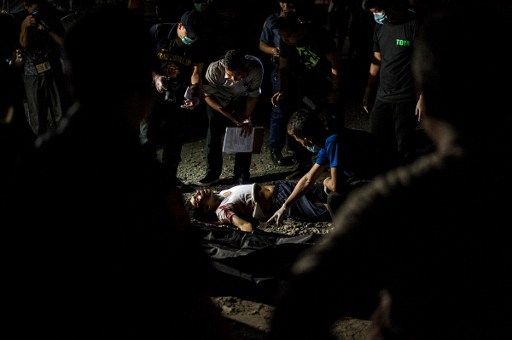Choosing its battles, CHR is silently probing extra-judicial killings

This photo shows a police officer investigating the dead body of an alleged drug pusher killed in the street in Manila. Hundreds of people have died since President Rodrigo Duterte won a landslide election in May, promising to rid society of drugs and crime in six months by killing tens of thousands of criminals. Police figures showed this week that 402 drug suspects had been killed a month into Duterte’s presidency. This figure does not include those slain by suspected vigilantes. AFP PHOTO/NOEL CELIS
While human rights groups have expressed alarm over the President Duterte’s bloody war against illegal drugs, the Commission on Human Rights (CHR) has silently pursued its investigation into the first few hundreds of the reported over 5,800 drug-related extrajudicial killings.
The country’s human rights watchdog has also taken into custody the few witnesses who have expressed willingness to testify when charges are filed in court.
The CHR has been choosing its battles.
“The challenge is the pace and scale of the extrajudicial killings and we do not have the resources to investigate all,” CHR chairperson Jose Luis Gascon told the Inquirer.
With a total staff of only 600, half of which are based in Metro Manila, the CHR has investigated approximately 420 cases of drug-related extrajudicial killings that occurred since Mr. Duterte assumed office.
Article continues after this advertisementThis represents less than one-tenth of the more than 5,800 reported killings of suspected drug peddlers and users from July 1 to Dec. 4, 2016, some in police operations but mostly by unidentified gunmen.
Article continues after this advertisementGascon said the CHR has concluded its independent probe on seven cases, and has recommended to the appropriate prosecutor’s offices the filing of charges against the assailants that included active policemen.
The CHR has yet to make these cases public, citing its intention of protecting the witnesses.
“But to be honest, we’re not holding our breath [that charges will be filed]. They will be held to account later. In the meantime, we’ll just continue documenting cases. We’ll just follow up,” Gascon said.
He took to task the Department of Justice (DOJ) for not automatically filing charges against policemen involved in operations that have led to the death of the suspects, arguing that it is the courts that weigh whether the operatives killed the suspects in self-defense.
Gascon said CHR Commissioner Leah Tanodra-Armamento, a former DOJ undersecretary and prosecutor, pointed out that this was the practice before.
“After five months with over 2,000 deaths where the suspect allegedly ‘nanlaban’ (fought back), has there been a charge filed in court by anyone in the prosecutor’s office? None,” he said.
“The whole commission is asking, why is that procedure that has been in place in the department previously, not being followed now?” he said.
Gascon, a lawyer, reminded the DOJ that it has the prosecution powers while the CHR’s jurisdiction in investigating cases of alleged human rights violations is “only fact-finding and recommendatory.”
“Secretary Aguirre cannot shift the burden of delivering justice to others as it is his,” he said.
Since it is not pinning its hopes on the DOJ initiating action on the extrajudicial killings, the CHR no longer refers complainants and witnesses to the DOJ’s Witness Protection Program.
Despite its limited budget, the CHR has kept in its custody witnesses who were “not comfortable” with the DOJ.
Gascon explained that the CHR is “thinking long-term,” when cases may be pursued after the President ends his term.
Gascon also mentioned bringing up cases before the International Criminal Court (ICC) “if the DOJ is unable and unwilling” to investigate and prosecute extrajudicial killings.
Despite Mr. Duterte’s threat, the ICC will have jurisdiction over cases of extrajudicial killings that take place in the Philippines until the country has officially withdrawn its membership in the court.
“Of course we reject that human rights is in the way of the antidrug campaign ,” Gascon said.